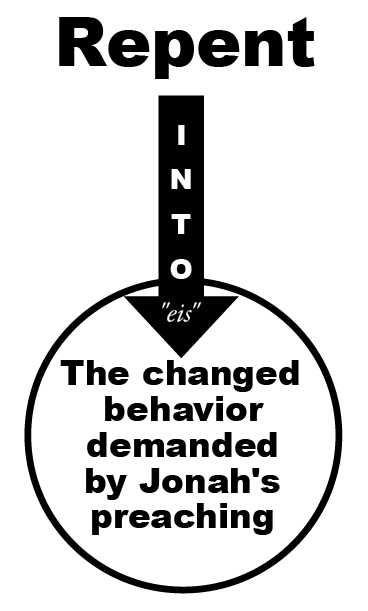
Repented “At” Jonah’s Preaching?
In an effort to avoid the force of Acts 2:38 as it pertains to the essentiality of baptism as a perquisite to remission of sin, some polemicists have set forth the argument that the Greek preposition eis can have a “causal” meaning. Hence, they insist that baptism is “because of” remission of sins, i.e., one is baptized because he is already saved, rather than baptized “in order” to receive salvation. As an example, they allude to Matthew chapter 12 where Jesus responded to the hardhearted scribes and Pharisees when they disingenuously asked for Him to perform a sign. Included in His response were these words: “The men of Nineveh will rise up in the judgment with this generation and condemn it, because they repented at the preaching of Jonah; and indeed, a greater than Jonah is here” (vs. 41). The English word “at” in this verse is a translation of the Greek preposition eis. On this basis, defenders of the “causal” meaning allege that this verse constitutes an instance of a “causal” eis. They ask: “Did the Ninevites repent in order to get Jonah to preach, or did they repent because of Jonah’s preaching?”

Jonah preached a succinct, simple, but demanding, message to pagan Gentiles. What was the result? Did they offer mere oral platitudes that paid lip service to religion—like the scribes and Pharisees? No, they truly repented. But, apart from Jesus informing us of their repentance, how do we know they repented, seeing that the Bible terms for repentance are not used in the Jonah account to describe their response? Because we are informed what, precisely, they did after hearing Jonah’s preaching: they proclaimed a fast, put on sackcloth, the king covered himself in sackcloth, sat in ashes, and sent forth a decree to all the Ninevites requiring abstinence from food and drink, and made loud entreaties to God (Jonah 3:5-9). Jonah 3:10 summarizes: “Then God saw their works, that they turned from their evil way; and God relented from the disaster that He had said He would bring upon them, and He did not do it.” Observe that their post-repentance activities are stylized “works” and that these extensive enactments were evidence of their repentance. Hence, they “repented into the preaching of Jonah.” Having been convinced by Jonah’s preaching to the point that they changed their thinking (i.e., repented), they then coupled their repentance with genuine compliance with the demands that Jonah laid before them. They repented into that state or condition demanded by Jonah’s preaching.1 A so-called “causal eis” does not exist.2
Endnotes
1 Jesus’ statement also constitutes an instance of the figure of speech known as “Metonymy of the Cause,” in which the cause or instrument is put for the thing effected by it. In this case, “preaching” was the instrument that Jesus mentioned, but what He was orally highlighting was the effect of Jonah’s preaching. For a discussion of this figure of speech, see E.W. Bullinger (1898), Figures of Speech Used in the Bible (Grand Rapids, MI: Baker, 1968 reprint), pp. 545ff.
2 For a discussion of the alleged “causal eis,” see Dave Miller (2019), Baptism and the Greek Made Simple (Montgomery, AL: Apologetics Press), pp. 39ff.


No comments:
Post a Comment